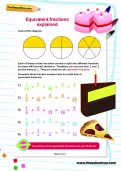Important update from TheSchoolRun
For the past 13 years, TheSchoolRun has been run by a small team of mums working from home, dedicated to providing quality educational resources to primary school parents. Unfortunately, rising supplier costs and falling revenue have made it impossible for us to continue operating, and we’ve had to make the difficult decision to close. The good news: We’ve arranged for another educational provider to take over many of our resources. These will be hosted on a new portal, where the content will be updated and expanded to support your child’s learning.
What this means for subscribers:
- Your subscription is still active, and for now, you can keep using the website as normal — just log in with your usual details to access all our articles and resources*.
- In a few months, all resources will move to the new portal. You’ll continue to have access there until your subscription ends. We’ll send you full details nearer the time.
- As a thank you for your support, we’ll also be sending you 16 primary school eBooks (worth £108.84) to download and keep.
A few changes to be aware of:
- The Learning Journey weekly email has ended, but your child’s plan will still be updated on your dashboard each Monday. Just log in to see the recommended worksheets.
- The 11+ weekly emails have now ended. We sent you all the remaining emails in the series at the end of March — please check your inbox (and spam folder) if you haven’t seen them. You can also follow the full programme here: 11+ Learning Journey.
If you have any questions, please contact us at [email protected]. Thank you for being part of our journey it’s been a privilege to support your family’s learning.
*If you need to reset your password, it will still work as usual. Please check your spam folder if the reset email doesn’t appear in your inbox.
Teachers’ top 10 classroom discipline tricks

1. Use incentives
“When I’m doing group work with children I always have a box of tricks with me, including stickers for neat work, good listening, sitting nicely, and so on. We also award house points for good behaviour. The challenge of earning a reward really helps to focus children on their work.”
Caren, year 6 teaching assistant


Boost Your Child's English & Maths!
- Weekly programme for each school year
- Worksheets sent direct to your inbox
- Keeps your child's learning on track
2. Set manageable goals
“If a child is complaining that his work is too hard, too boring or taking too long, I’ll set a short-term goal; for example, I’ll put a dot on his page for where he should write to in the next five minutes.”
Lou, year 6 teacher
3. Be hands-on
“When a child physically drifts away from a task, I’ll go up to her, take her by the shoulders and gently steer her back to where she should be. This works even if she hasn’t left the table; just putting a hand on her shoulder lets her know that I’m watching her.”
Tina, year 4 teacher
4. Make time to listen
“When children are moaning about their work, often the main issue is the fear of failure, rather than the fact that they actually can’t do it. Rather than dismissing their worries, I give them time to speak about what the problem is; generally, just a few seconds of listening works wonders.”
Caren
5. Give a hard stare
“I use subtle strategies when children are messing about and distracting each other. Often, I’ll just pause, raise my eyebrows and stare at the child until she realises that I’ve spotted her, or weave her name into the middle of a sentence – much more effective than shouting.”
Lou
6. Model good behaviour
“The key to promoting good behaviour is to be a positive role model. Be polite, approach arguments calmly and don’t get drawn into losing your cool. Speak quietly, be considerate and expect the children to do the same.”
Becky, year 1 and 2 teacher
7. Use a timer
“I often use a sand timer to show children how long I expect them to stay on task for. The concept of ‘five minutes’ is beyond some children, but seeing the sand passing through the timer makes it easier to see how much longer they have to work for.”
Victoria, special educational needs coordinator
8. Be supportive
“Problems often arise when children don’t know what is expected of them. Before I begin a task with the class or a group, I’ll spend a few minutes talking it through to make sure they understand it. If they’re struggling, I’ll use prompts such as pictures, or give them a few key words to start them off, so I’m supporting them without doing the work for them.”
Lou
9. Use sanctions
“If behaviour is getting out of hand, I’ll use sanctions such as removing computer time or free play time, but only ever after giving at least one warning.”
Becky
10. Praise, praise, praise
“Whenever a child is unhappy about having to work, I bolster his self esteem by pointing out all the good things he has done so far. It takes 20 positive comments to outweigh one negative, so praising children is essential – there is no substitute for encouragement.”
Victoria
Read more expert advice from teachers and tutors on helping your child with homework, learning to spell or memorising times tables.







